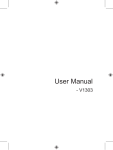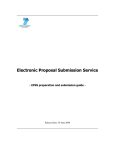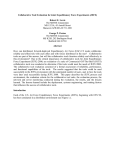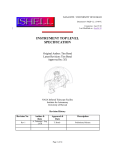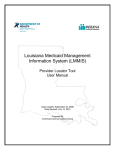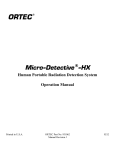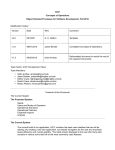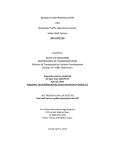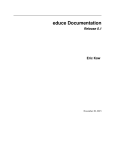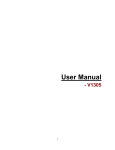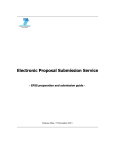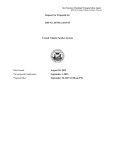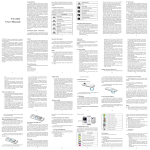Download Document IUSP-01 - Gemini Observatory
Transcript
REQUEST FOR PROPOSALS (RFP) – N60354C
For
GEMINI Instrument Upgrades: Small Projects
RFP Main Document (IUSP-01)
ASSOCIATION OF UNIVERSITIES FOR RESEARCH IN ASTRONOMY, INC
OPERATING THE GEMINI OBSERVATORY
Hilo, Hawaii and La Serena, Chile
RFP Schedule
RFP Issued: October 6, 2015
Proposals due: December 17, 2015, 3:00pm MST
Prepared by
AURA Procurement Office
950 N. Cherry Ave.
Tucson, AZ 85719
1
N60354C: IUSP-01: RFP Main Document
Table of Contents
SECTION I. INTRODUCTION AND BACKGROUND
RFP Selection Events
SECTION II: STATEMENT OF WORK, REQUIREMENTS, AND PROJECT DELIVERABLES
Statement of Work
Reference Documents
Requirements
Project Deliverables
Intermediate Deliverables
Final Deliverables
SECTION III: INSTRUCTIONS TO PROPOSERS
Request for Proposal Documents
Intent to Submit
Submitting a Proposal
Acknowledgement of Proposals
Modification of Proposal
Proposal Withdrawals
Proposal Representations
SECTION IV: EVALUATION CRITERIA
SECTION V: COMMUNICATIONS AND QUESTIONS
APPENDIX A: DOCUMENTATION SET
2
N60354C: IUSP-01: RFP Main Document
SECTION I. INTRODUCTION AND BACKGROUND
The Gemini Observatory consists of two 8-meter telescopes, one located on Maunakea in
Hawaii, USA (Gemini North), the other on Cerro Pachón, Chile (Gemini South). The
Association of Universities for Research in Astronomy, Inc. ("AURA") is the managing
organization of the Gemini Observatory under a cooperative agreement with the National
Science Foundation for the benefit of the Gemini funding nations: The United States of
America, Canada, Brazil, Argentina, Australia, and Korea (the latter two as limited-term
partners during 2016). For more information, visit the Gemini Observatory website at
www.gemini.edu.
AURA and Gemini Observatory are committed to providing its community with the best
possible competitive instrumentation suite given technological and financial
constraints. This commitment includes investing funds to upgrade its operational
instruments to keep them scientifically competitive. Gemini’s development program will
provide funding to upgrade existing operational instrumentation, creating new instrument
capabilities at the Gemini North and/or Gemini South telescopes. The current release of
funds for this purpose has been labeled ‘Instrument Upgrades: Small Projects’ (IUSP). The
Observatory is seeking community-created, science-driven instrumentation upgrade
proposals, and will consider any area that fits the set of IUSP requirements provided
below. The Science and Technology Advisory Committee (STAC) endorsed Gemini’s
guidelines for the IUSP activity in its 2015A report.
Gemini has a total budget of $200,000 for the IUSP in this call and is intending to fund
two or more projects; however, compelling proposals requesting up to the whole budget
will be fully considered. Gemini also welcomes proposals to perform instrument upgrades
with minimal or no funding from Gemini.
The RFP is open to all institutions or companies from Gemini partner nations. The RFP is
open to non-partner country Principal Investigators who have significant and relevant
experience in using, designing, and/or building a Gemini instrument. Small businesses,
minority-owned firms, and women’s business enterprises that meet the minimum
qualifications are encouraged to apply.
3
N60354C: IUSP-01: RFP Main Document
RFP Selection Events
RFP Schedule
Date
Release RFP
6 October 2015
Email Notice of Intent to Submit Proposal
27 November 2015
Proposal Deadline
17 December 2015 at 3:00 PM (MST)
10 February 2016
Contractor selection
(This date is estimated and only included to
provide proposers scheduling
guidance. Selection may occur sooner or
later.)
4
N60354C: IUSP-01: RFP Main Document
SECTION II: STATEMENT OF WORK, REQUIREMENTS, AND PROJECT DELIVERABLES
Statement of Work
Gemini Observatory seeks to maximize flexibility and enhance instrument performance by
funding small projects to upgrade multiple operational instruments in one or both
observatory locations. IUSP projects should produce a tangible result that creates or
enables new science based on existing facility operational instruments that meet Gemini's
constraints and needs including funds available, desired schedule, and community input.
This program is not intended for design studies for future operational instruments or
larger upgrades. Data processing software project proposals that do not increase an
instrument’s capability will not be considered.
Gemini will provide:
● Up to 10 hours of on-sky telescope time per project to be used for demonstrating the
upgraded instrument’s new capability.
● All relevant existing instrument documentation, i.e. the existing design records,
technical manuals, service and calibration manuals, data reduction pipeline
manuals, and user manual.
● All needed, relevant existing instrument software, i.e. the existing instrument
control software, data reduction pipeline software, etc.
● Available facilities, equipment, and staff support (See Requirement 7) to support the
upgrade.
Reference Documents
Gemini operational instruments information website.
Requirements
1. The project’s scientific value must be clearly described in the proposal.
2. Each proposal must include top-level science requirements for the upgrade derived
from one or more sufficiently developed science cases.
3. Gemini will only consider proposals for instrument upgrades of minimal to
moderate technical risk. The proposal must thoroughly identify and suggest the
mitigation of key risks and expected instrument downtime.
4. Proposals must demonstrate the designed upgrade is technically achievable with
existing technology.
5. The proposed instrument upgrade must not require major alterations to the Gemini
telescopes and must comply with the Gemini Interface Control Documents (ICDs).
6. The project must include readiness testing prior to going on-sky and full
5
N60354C: IUSP-01: RFP Main Document
characterization of the upgrade after going on-sky.
7. The proposal must clearly state the Gemini documentation and Gemini resources
needed for project completion. The project should require a minimal level of effort
from Gemini staff. Gemini will assess the impact of the project and the outcome
against the resources needed to support the project. Gemini will assign the relevant
resources, pending availability, to support the team in its work such that each
upgrade is successfully achieved.
8. The project must provide any necessary updates to existing instrument
documentation and Gemini-supplied data reduction software and procedures
resulting from the upgrade. The proposal must state what documentation will be
delivered as part of the upgrade.
9. The proposal must include a description of the proposed instrument upgrade and
functions. Documentation must include the relevant layouts describing the optical,
opto-mechanical, electrical, and software elements of the proposed instrument
upgrade.
10. Work for each project is expected to be completed within twelve (12) months of
contract execution.
11. The proposal may request up to 10 hours of on-sky telescope time to demonstrate
and realize the scientific capability of the upgrade. The request must describe how
the requested telescope time will be used to demonstrate the new scientific
capability.
Project Deliverables
Intermediate Deliverables
The Contractor and Gemini shall agree to a list of key intermediate deliverables and
milestones based on the proposals and subsequent contract negotiations. The
intermediate project deliverables will include:
1. Kick off Meeting: Within one week of Contract execution, Contractor shall host a
kickoff meeting to clarify the project and its requirements. The Technical
Representative and other Gemini personnel shall attend (either in person or via
videocon) for Gemini, and at least all key members of Contractor's team shall attend.
2. Progress Reports: A brief written monthly progress report highlighting the work
performed and costs incurred during the previous month, noting any significant
changes in the baseline schedule or the project’s risks. The progress report should
also track assigned action items between AURA and the team. The Progress Report
is intended to be brief and serve as an auditable record of work performed.
3. Monthly Videocon: By the fifteenth day of each month, the Contractor and the
6
N60354C: IUSP-01: RFP Main Document
Technical Representative will have a videocon arranged by Gemini, in which Gemini
and the Contractor will review that month’s Progress Report.
4. Acceptance Test Plan: An acceptance test plan is required before commencing any
changes to the instrument and its associated systems. The test plan shall include
benchmark tests to unambiguously assess performance before and after the changes
occur.
5. Gemini Visit: Gemini may choose to visit the worksite to review work progress
and/or evaluate project readiness for delivery. Gemini will cover all costs for its
employees while the host will supply the necessary meeting venue and staff.
Final Deliverables
1. Upgraded Instrument: (hardware and/or software) according to the accepted
IUSP proposal.
2. Acceptance Test Report: The Acceptance Test Report will contain measured
results against the test contained within the Acceptance Test Plan. The report will
contain results for the instrument before the upgrade took place and after the
upgrade took place. The compliance summary matrix must compare the
requirements with the achieved performance after the upgrade.
3. Updated Instrument Documentation Set: Update relevant components of the
instrument documentation set which may include the User’s Manual, Operational
Concept Definition Document, Service and Calibration Manual, Functional
Performance Requirements Document, Instrument Records, User Manual, Software
Manual, and Data Reduction Pipeline Manual (see Appendix A for further
information).
4. End of Project Report: to include a re-commissioning report, a summary of
objectives achieved, and lessons learned.
5. Instrument Upgrade Announcement: An announcement and synopsis describing
the instrument upgrade and demonstrating its performance, including any
preliminary scientific results from the commissioning data.
Additional deliverables should be defined within the proposal itself in accordance with the
specific aspects of the upgrade. Depending on the proposal, not all of the instrument
documentation set may need updating. For example, there would be no reason to upgrade
mechanical drawings if the upgrade were purely software.
7
N60354C: IUSP-01: RFP Main Document
SECTION III: INSTRUCTIONS TO PROPOSERS
Request for Proposal Documents
This Request for Proposal is comprised of the following documents:
1. Request for Proposal (Document IUSP-01), this document.
2. Proposal Form (Document IUSP-02) available in Microsoft Word format. Please
review this document carefully before beginning work on your Proposal.
3. Fixed-Price Gemini Observatory Instrument Upgrade: Small Projects contract. This
is the contract that will be used for the contract awarded as a result of this RFP. This
contract is made up of the following elements:
A. Main Document (IUSP-03.1), which covers the basic terms of the contract
(including price schedule) that will be used for the project. Although this
document has a signature line you do NOT need to fill this in or return it as
part of your proposal.
B. Statement of Work (IUSP-03.2).
C. Terms and Conditions (IUSP-03.3).
D. Accepted Proposal.
Intent to Submit
Please notify AURA of your intent to a submit proposal(s) by the 27 November, 2015.
Please send an email to the AURA Contracts Officer (see Section V) stating that you intend
to submit a proposal and provide the names of the institutions involved. This information
will allow AURA to ensure that the members of the evaluation committee reviewing the
proposals do not have any conflicts of interest. Failure to give advance notice of your intent
to submit a proposal and/or failure to disclose membership of your team may result in
delays in the selection process. AURA will not publicly disclose the names of the
institutions and companies that notify Gemini of their intent to propose.
Submitting a Proposal
Proposals are contractually binding offers. By submitting a proposal you are making an
offer to enter into a contract. You also agree that if you fail to sign such a contract promptly
when it is offered to you, AURA may elect, at its sole discretion, to offer a contract to
another proposer.
Each proposal must have a lead institution. A group of institutions may not submit a joint
proposal in which multiple institutions are all listed as equal partners. The only way for a
group of institutions to submit a proposal is for one company to submit a proposal as a lead
contractor with the other institutions listed as subcontractors. We require a single lead
contractor for each team so that the contract can be quickly awarded without delays
associated with placing multiple contracts for one team's effort. It is the lead contractor’s
8
N60354C: IUSP-01: RFP Main Document
responsibility to ensure subcontractors are ready to start and complete the work within
the required period.
Download and complete the Proposal Form (Document IUSP-02) in Microsoft Word format,
answer all the questions, and provide all the requested information and documentation. In
addition, complete and submit your proposal containing the following listed sections:
(provided page limits are meant as generous limits and are not meant to imply each section
must be that length; shorter submissions are happily accepted):
1. Executive Summary (two pages). A brief summary of proposed project that includes
the science case, the proposed upgrade, and the impact on and involvement with the
Gemini community.
2. Scientific Justification for the instrument upgrade and science requirements (up to 6
pages).
A. Include the science objectives/questions/cases on which the work will be
based and a description of the science enabled by the instrument upgrade.
B. Describe the relevance to astronomers in the Gemini partner communities
and how/if the science case provides synergies with existing and future
capabilities and survey discoveries.
C. Clearly derive any provided science requirements from the provided science
case.
3. Proposal for up to 10 hours of telescope time using the upgraded instrument to
realize an early science objective aimed at demonstrating the upgraded capability
(up to 2 pages).
4. Technical Requirements and Design Changes (up to 8 pages).
A. Present a description of the proposed instrument upgrade and its
function(s). Include a proposed list of deliverables.
B. Provide a list of changes to the instrument’s technical/performance
requirements.
C. Provide a list of the documentation and technical information required from
Gemini.
D. Provide available details of any planned optical, opto-mechanical, electrical,
and software changes including changes in the instrument’s major
subassemblies that would be changed during the project.
E. Demonstrate the feasibility of the instrument upgrade.
F. Demonstrate that the instrument design will fit within the technical
constraints and flexible operating environment of the Gemini telescopes.
G. Provide a description of the known risks associated with the proposed
upgrade along with plans to address them.
5. Project Management, System Engineering, and Team Experience (up to 8 pages).
9
N60354C: IUSP-01: RFP Main Document
A. Provide an organizational chart, work breakdown structure, and project
schedule for the project.
B. Provide an explanation of how cost, schedule, and requirements will be
monitored and controlled during the work.
C. Provide a description of the overall risk management approach.
D. Provide a description of any systems engineering methods to be used and
tools that would be used during the project.
E. Provide a description of the project management approaches and tools that
would be used during the project.
F. Provide background information including the experience, knowledge, and
strengths the team would bring to Gemini in performing the work.
G. Provide details of any work that would be subcontracted along with the
relevant qualifications and experiences of the proposed subcontractor(s).
H. Provide any available statements of support from the lead institution and
describe the priority of this project relative to others being undertaken.
6. Publication List: Provide a relevant scientific and technical publication list for key
member of the team.
Have the completed Proposal Form reviewed, approved, and signed by the appropriate
administrative official of your institution or company who has authority to bind your
institution or company to contractual obligations. In addition, ensure that you have
equivalent assurances from all subcontractors.
The entire report must be paginated. Margins in all directions must be at least one inch.
Proposal text must be in a standard, single-column format.
Proposals must be submitted as a single electronic document in Adobe Acrobat PDF format.
Please do not send a hard copy and do not submit multiple electronic documents.
Whenever possible, the size of the PDF file should be minimized by printing documents
directly to PDF instead of scanning them. Where signatures are required in the Proposal
Form, proposer may effectively sign by either: (1) Electronically signing a PDF file using the
Adobe Acrobat Digital Signature Tool; or (2) Sign a hard copy and then scan the signed
page to PDF and attach the signature page to the main document.
Submit your proposal by emailing it as a PDF file attachment to the AURA Contracts Officer
(see Section V). All proposals must be received by AURA on or before the due date and time
stated at the top of this document.
No oral, telegraphic, or telephonic Modifications to Proposals will be considered.
Modifications to Proposals submitted may be made electronically, if the modified Proposal
Documents are delivered to AURA in accordance with the Modification of Proposal section
(below) before the Proposal due date.
10
N60354C: IUSP-01: RFP Main Document
If selected and contract objections exist, AURA will strive to resolve all objections within 10
working days of selection.
Acknowledgement of Proposals
Receipt of proposals will be acknowledged by email by 5:00pm MST of the next working
day following the deadline for submitting proposals. Please contact the AURA Contracts
Officer (see Section V) if you do not receive an acknowledgement. AURA reserves the right
to accept proposals submitted after the deadline if it can be documented that the failure to
meet the deadline was due to technical problems with the transmission of the proposal by
email.
Modification of Proposal
Proposals that have already been submitted may only be modified by means of submitting
a replacement proposal before the deadline for receipt of proposals. Proposals may not be
modified after the due date.
Proposal Withdrawals
A Proposer may withdraw its Proposal(s) by written request (i.e., email) at any time prior
to the scheduled closing time for receipt of Proposals. Thereafter, all proposals, including
all subcontracts, must be valid for 120 days and cannot be withdrawn or modified during
that period. Contractors must ensure that this requirement is effectively communicated to
all their subcontractors.
Proposal Representations
By submitting a proposal you are representing that you have carefully examined this RFP
and its referenced documents, understand all aspects of the work, and are not aware of any
ambiguities in the scope of work or specifications that may affect your proposed price or
schedule. By submitting your proposal, you are also representing that:
1. You have the technical and management capabilities to perform the work in a timely
and competent manner.
2. You are not aware of any pending legal, financial, or other action that could have a
material detrimental effect on your ability to perform the work in a timely manner.
3. You have the financial resources reasonably required to complete the work in a
competent and timely manner.
4. You have the proposed facilities, tools, staff effort, and equipment necessary to
perform the work in a timely and competent manner.
11
N60354C: IUSP-01: RFP Main Document
SECTION IV: EVALUATION CRITERIA
AURA will use evaluation scores to assist in selecting proposals for contract award and
will consider the following criteria in preparing evaluation scores. The evaluation criteria
are listed below with their weighting.
Criterion
Weight
Scientific Justification for the instrument upgrade and science requirements
40%
1. Is the proposed scientific benefit of value to the Gemini community?
2. Has the proposal included clear and comprehensible science objectives/questions
that the work will address?
3. Does the science case clearly include a description of the science enabled by the
instrument upgrade?
4. Is the scientific motivation for the proposed instrument upgrade relevant and well
justified?
5. How well have the science requirements been derived from the science case?
6. Are well-defined metrics proposed for assessing the outcomes?
Technical Requirements and Design Changes
30%
1. Is the proposed work technically feasible with an acceptable level of risk and
lifetime support from Gemini staff?
2. Has the team demonstrated that the proposed upgrade design will achieve the
objectives described in the scientific justification?
3. Are the top-level technical specifications clearly linked to the science requirements
and science case?
4. If appropriate, does the proposal provide details of the optical, opto-mechanical,
electrical, and software design of the proposed instrument upgrade, detailing the
subassemblies to be changed? Are they appropriate given the intended upgrade?
5. How well does the proposal describe any known technical risks associated with the
proposed instrument upgrade and present mitigation plans?
6. Does the proposed instrument upgrade fit within the technical constraints of the
Gemini telescopes?
7. The instrument must not require major alterations to the Gemini telescopes; if
relevant, how well does the proposed upgraded instrument comply with the Gemini
ICDs?
8. Has updating the relevant documentation been included in this proposal? Is it
appropriate given the scale of the project?
9. Are the documentation and technical resources requested from Gemini available?
12
N60354C: IUSP-01: RFP Main Document
Project Management, System Engineering, and Team Experience
30%
1. Is it demonstrated that the envisioned instrument upgrade can be executed within
Gemini’s cost and schedule envelopes?
2. Does the project plan consider the impact on Gemini resources and required Gemini
staff level of effort?
3. Does the proposal include an explanation of how cost, schedule, and requirements
will be monitored and controlled?
4. How well does the proposal describe the system engineering methodology, project
management approach, and tools to be used during the project execution?
5. Is the team well suited (qualified) and supported for successful completion of the
proposed work?
6. Does the proposal include a list of relevant scientific and technical publications for
key members?
7. Has a statement from the lead institute(s) been given to express the relative priority
of this project, should it be awarded?
8. How reasonable and realistic is the proposed installation schedule?
9. How well does the proposed installation schedule meet the expectations of AURA
and Gemini?
10. Is the team well suited to perform the proposed work successfully?
11. What will be Gemini’s ongoing operational and maintenance costs associated with
this upgrade?
12. Is the proposed scientific use of the requested observing time well justified?
Proposal Price
Gemini has a total budget of $200,000 for the IUSP in the 2015 call and is intending to fund
two or more projects; however, compelling proposals requesting up to the whole budget
will be fully considered. All proposals must be submitted to Gemini to allow for evaluation,
review and internal planning for the allocation of Gemini support and resources. A price
and cost analysis will be conducted as part of the evaluation.
In addition to the evaluation described above, AURA will consider each proposal’s
perceived value in making its final selection.
13
N60354C: IUSP-01: RFP Main Document
SECTION V: COMMUNICATIONS AND QUESTIONS
Any questions or requests for clarification of this Request for Proposals document should
be directed to:
Karen Godzyk
Contracts Officer
Association of Universities for Research in Astronomy, Inc.
950 N. Cherry Avenue
Tucson, AZ 85719
Email: [email protected]
(520) 318-8357 (MST)
To receive updates about the IUSP RFP, please provide contact information including an
email address to the AURA Contracts Officer.
General procedural questions can be handled by telephone. Questions or requests for
clarification regarding the statement of work, requirements, or specifications must be
submitted by email and must be received at least five working days before the due date for
proposals. Answers and clarifications that modify or clarify any of the documents included
in this RFP will only be made in writing; contractors shall not rely on verbal answers or
clarifications. AURA may decide to share any questions and their answers with all of the
contractors by issuing a supplement to the RFP.
To ensure that all potential Contractors receive the same information, clarification or
direction by other persons at AURA or individuals at the Gemini Observatory is not
permitted during the RFP process. Contractors may not contact any other person at Gemini
regarding this procurement without express permission from the AURA Contracts Officer,
and contractors may be disqualified from participating in this procurement if they attempt
to communicate about this procurement with AURA or Gemini personnel other than the
AURA Contracts Officer.
Contractors may request modifications to any requirements that are impossible to meet or
that appear to needlessly increase the cost of the work. These requests for modifications
should be submitted as early as possible before the due date for submitting proposals.
Modifications will be issued to all contractors through an amendment to the RFP.
AURA may modify parts of the RFP after it has been released. Modifications will be made
only by means of amendments to the RFP posted at the top of the RFP web page. Proposers
are encouraged to check the Gemini website regularly. Verbal amendments will be void, so
do not rely on any modification to anything in this RFP unless it has been confirmed by a
written RFP amendment posted on the website.
14
N60354C: IUSP-01: RFP Main Document
APPENDIX A: DOCUMENTATION SET
Depending on the specific aspects of the upgrade, the updated instrument documentation
set may include:
A. User’s Manual, OCDD/ConOps Manual: Changes in which the contractor
describes each of the changed instrument's operating modes and their key
operating scenarios.
B. Service and Calibration Manual: The contractor describes the relevant
changes, additions, and deletions to service and calibration needs and
procedures as a result of the upgrade. This includes:
1) A description of optical mounting schemes, including the approach
used to mount and align any changed mechanical and optical
subassemblies.
2) A description of new key risks, e.g. long-term stability of optical
alignment, manufacturability, coating reliability, expected lifetimes,
etc. and an updated risk register for the changed instrument /
subassemblies.
3) Outline of instrument integration procedure with any new
subassemblies.
C. OCDD and FPRD/Requirements Document: Changes to the instrument
requirements and requirement traceability according to the changes
performed to the instrument.
1) Each new/changed requirement must identify the source(s) used to
derive it, briefly describe how the requirement was derived from its
source, and explicitly state any assumptions made.
2) Each new/changed requirement must be quantified and objectively
verifiable at some stage in the testing or commissioning of the
instrument upgraded subsystems.
3) Include a description in the OCDD of how the science cases flow down
to the top-level instrument requirements.
D. Instrument Records: Contractor shall document the key engineering design
changes including:
1) A description of the changed instrument’s subassemblies.
2) Changes to any instrument optical design files.
3) Changes to any mechanical design and manufacturing drawings.
4) An overview of any modified electronic systems including a detail of
all commercial and custom boards used.
E. Technical Manual/User Manual: Contractor shall document the any optical
and mechanical changes of the upgrade by including at least the following:
15
N60354C: IUSP-01: RFP Main Document
1) A depiction of the general layout of the mechanical and optical
components to be affected by the upgrade, including designs (3D
models/drawings), spot diagrams, flexure analysis, tolerance, etc., as
needed.
2) A demonstration that the instrument’s new capability is operating
under Gemini’s interfaces (see Interface Control Documents) and
operating environment, including flexure, vibration, windshake,
temperature, humidity, dust, etc.
3) A description of any new/changed throughput budgets or required
optical tolerances for the changed optical subassemblies.
4) Details of any new or modified observing modes.
F. Software Manual: If there are upgrades to instrument operation software, the
contractor must deliver a description of the new software work and design,
including.
1) A top-level flow chart or other description of the structure and
function of the new code.
2) In-code documentation consistent with that previously present in the
existing code. Regardless of existing inline documentation, upgrade
inline documentation must adequately describe the workings of the
code so that an experience software engineer not familiar with the
upgrade code could understand it.
3) A top-level description of any internal interfaces to third party
products, with a focus on types of communication between software
components and protocols.
4) A top-level description of required development platforms and tools,
with specific identification of which items will need to be acquired.
G. Data Reduction Pipeline Manual: Contractor will provide any needed update
to the data reduction software and documentation including a document
describing the changes in the data reduction process.
16
N60354C: IUSP-01: RFP Main Document




















